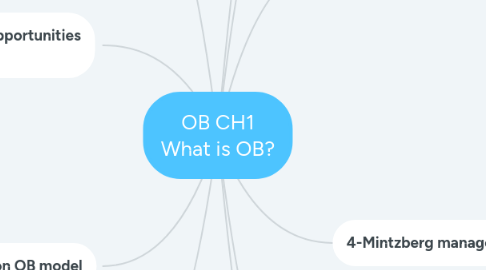OB CH1 What is OB?
by Loaa Essam EL-din


1. Organize
2. 1-The importance of interpersonal skills
2.1. Technical and qualitative skills are important
2.2. But relationships and communications skills are critical
2.2.1. Organizational benefits of skilled managers: 1-Lower turnover of quality employees 2-Higher quality applications for recruitment 3-Better financial performance
3. 2-What managers do
3.1. They get things done through other people.
3.2. Management Activities: Make decisions Allocate resources Direct activities of others to attain goals
3.3. Work in an organization: A consciously coordinated social unit composed of two or more people that functions on a relatively continuous basis to achieve a common goal or set of goals.
4. 4-Mintzberg managerial roles
4.1. Ten managerial roles Separated into Three groups: 1-Interpersonal 2-Informational 3-Decisional
4.1.1. 1-Interpersonal
4.1.1.1. 1- figurehead
4.1.1.2. 2-Leader
4.1.1.3. 3-Liaison
4.1.2. 2-Informational
4.1.2.1. 1-Monitor
4.1.2.2. Disseminoter
4.1.2.3. Spokesperson
4.1.3. 3-Decosional
4.1.3.1. Entrepreneur
4.1.3.2. Disturbance handler
4.1.3.3. recorse allocator
4.1.3.4. Negotiator
